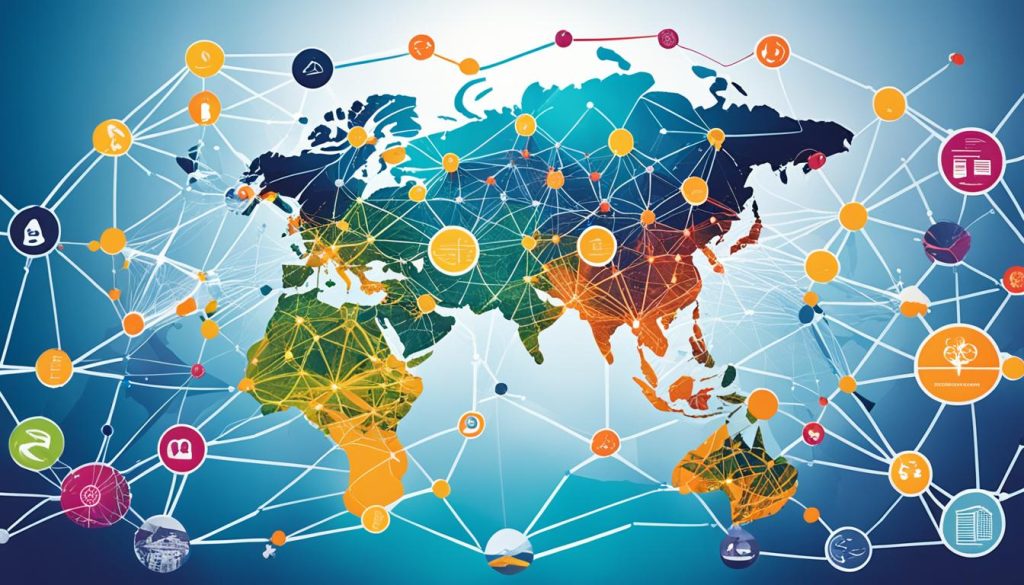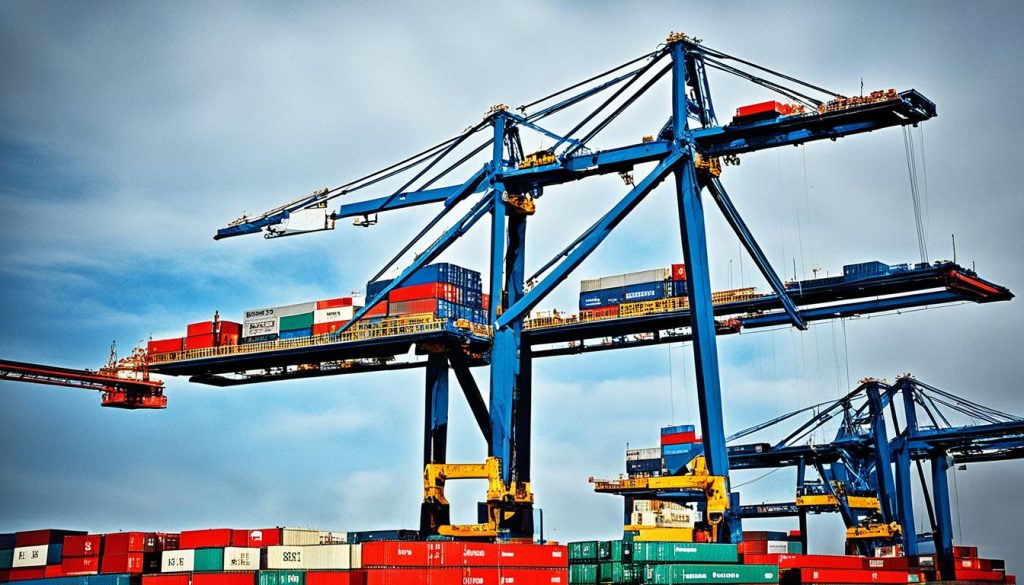Multinational corporations (MNCs) play a huge role in the world economy. They affect trade, how markets work, and societies too. This part looks at what MNCs do, both the good and the bad. It shows how they change the way businesses work around the world.
Key Takeaways
- Multinational corporations shape the business world, affecting trade and economics.
- They bring new technologies and ideas to local markets.
- MNCs create lots of jobs but sometimes don’t treat workers fairly.
- They can harm the environment because of their size.
- Being so big, they can control markets, which isn’t always fair.
Understanding Multinational Corporations
Multinational corporations (MNCs) play a big role in the world’s markets. They work in many countries, using either local branches or partnerships. Their main task is to oversee operations in different areas, making them key players in global trade.
By using a variety of resources and markets, they stay competitive and last a long time. MNCs are found in all kinds of fields, from medicine to tech. This shows how important they are to the world’s economy.
Definition and Scope
MNCs are companies that operate in more than one country. They usually have a main office that makes big decisions. However, they let local branches make some decisions to better respond to local needs.
They are active in many sectors like technology and healthcare. Big names such as Apple, Samsung, and Unilever show how diverse and widespread MNCs are.
Brief History and Evolution
The history of MNCs goes from the East India Company to today’s giants. Through time, these companies have reached key milestones and become major players in international business.
After World War II, new technologies and trade laws helped MNCs grow even more. Companies like IBM and Nestlé have led the way in innovation and in connecting global markets.
| Company Name | Industry | Founded | Notable Milestones |
|---|---|---|---|
| Apple | Technology | 1976 | Launched iPhone, expanded retail globally |
| Samsung | Electronics | 1938 | World’s largest smartphone manufacturer |
| East India Company | Trade | 1600 | First multinational corporation |
Economic Impact of Multinational Corporations
Multinational corporations (MNCs) have a huge economic impact worldwide. They operate in different countries, affecting global markets. Their presence boosts the gross domestic product (GDP) of countries they enter.
MNCs boost GDP through investments, creating jobs, and bringing new technology. They invest large amounts of money, which helps the economy grow. They also make the industries of their host countries stronger. Their jobs improve lives and raise skills of local workers.
Also, MNCs help make global markets work better. They create connected supply chains and distribution networks. This makes goods, services, and money move easily across countries.
They make local markets more competitive. This pushes local companies to get better and be more efficient.
By exporting from host countries, MNCs help get positive trade balances. This improves the global economic position of these nations. So, MNCs don’t just impact local markets but affect the world economy.
In short, multinational corporations drive economic change in many places. They not only influence GDP but also global markets and international economic activities. They are key players in the economy today.
Advantages of Multinational Corporations

Multinational corporations (MNCs) boost both global and local economies in many ways. They create jobs, bring in new technologies, and attract lots of investments. By looking into these benefits, we can see their value to society.
Employment Opportunities
MNCs are key in creating numerous jobs around the world. They open new branches or factories in different places, offering many jobs to locals. Besides, the competition for jobs makes workers improve their skills. This leads to more stable economies through ongoing job creation.
Technology and Knowledge Transfer
MNCs also play a vital role in sharing technology and knowledge. They bring new tech and practices to the places they operate in. Local businesses get to learn and embrace these advancements, boosting their productivity and innovation. It leads to a smarter, more skilled workforce.
Volume of Investments
The investments MNCs make are huge, often more than local economies expect. This money goes into building infrastructure, industrial growth, and boosting economic activity. Such investments are crucial. They provide the support needed for large-scale development projects..
MNCs offer several key benefits globally. They generate jobs, share technology and knowledge, and bring in investment. Together, these aspects greatly support economic growth. They make host countries more prosperous.
Disadvantages of Multinational Corporations
Multinational corporations (MNCs) often draw criticism. They can harm local economies, the environment, and how markets work. These firms bring some economic perks. Yet, we can’t ignore the downsides.
Exploitation of Labour
Labour exploitation is a big problem. MNCs tend to build factories in developing nations where worker protections are weak. Employees in these plants usually endure tough conditions, are paid little, and work long hours without fair pay. Such exploitation damages local economies and fuels poverty.
Environmental Concerns
MNC operations are linked to environmental harm. They often pick locations with lax environmental rules. This leads to severe damage to nature. Pollution, chopping down forests, and mishandling waste are ways MNCs hurt the environment. This behavior harms local communities and the planet’s ecological balance for the long term.
Dominance and Market Monopolies
MNCs can also dominate markets and create monopolies. This is bad for competition and new ideas. Their huge budgets and global networks let them crush smaller companies. This control can result in unfair business dealings. Small companies can’t keep up. This means less variety and choice for buyers.
The following table summarises some of the key disadvantages associated with MNCs:
| Disadvantage | Description |
|---|---|
| Labour Exploitation | Underpaying workers, poor working conditions, lack of labour rights |
| Environmental Degradation | Pollution, deforestation, global ecological harm |
| Market Monopoly | Dominance of markets, stifling competition, unfair trade practices |
The Role of Multinational Corporations in Developing Countries
Multinational corporations (MNCs) greatly influence developing nations. They boost the economy and help improve infrastructure. But, they also bring challenges along with opportunities.
In emerging markets, multinationals kickstart economic growth. They bring in new technologies and business methods, lifting local industries. They create jobs and train workers, boosting the local economy and paving the way for more growth.
MNCs often help build needed infrastructure like roads and telecommunications. These investments not only help the corporations but also improve local life. They make it easier for people to connect and access important services.
However, there are some downsides. Relying too much on a few big corporations can be risky. If they change plans or leave, it can hurt the economy. Also, the pay gap between MNC workers and others can grow, causing more inequality.
To sum up, multinationals have both good and bad effects in developing countries. They can help economies grow and build crucial infrastructure. But, countries need to be careful to avoid the pitfalls.
Advantages and Disadvantages of Multinational Corporations

We need to look at both the good and bad sides of multinational corporations (MNCs). Their impact can vary greatly, depending on the industry, their business methods, and where they operate.
Balancing the Benefits and Drawbacks
MNCs offer major benefits like bringing in money, creating jobs, and introducing new technology. This leads to strong economic growth in the countries they enter. But, they can also exploit workers, harm the environment, and dominate markets unfairly. Understanding these aspects helps us see the full effect of MNCs on the world.
Case Studies from Various Sectors
Let’s explore case studies from different industries to understand MNCs better. For example, in tech, companies like Apple have launched advanced technologies but faced backlash over worker treatment. Pharmaceutical companies like Pfizer have made medicines more available worldwide but have been criticised for their pricing. And manufacturers like Toyota have changed how products are made but had to deal with environmental concerns. Each story shows the different results of MNCs’ global presence.
Regulation and Policy Making
Regulating large companies involves balancing global management with international business rules. Policymaking here is vital to make sure companies act fairly, prevent misuse, and protect everyone involved. These policies affect both national and international levels, pushing for ethical behaviour and responsible business actions.
International frameworks are key to managing global companies, setting rules that match business actions to ethical standards. These rules tackle problems like tax dodging, unfair work practices, and damage to the environment. They make big corporations work in a way that’s clear to everyone, aiming for a future that’s good for us all.
The effect of corporate policies is huge. Organisations like the OECD and the ILO create policies that guide national laws. These rules make sure companies answer for what they do in different places. They push for clear and fair operations.
A detailed look shows the big role of global governance, international rules, and corporate policies in the business world. The connection between these elements is crucial for a fair and moral business scene.
Impact on Local Businesses
The relationship between big international companies and local businesses is quite complex. It greatly affects the local business scene. One major part of this relationship is how it brings both opportunities and threats to local companies.
Competitive Advantage and Threats
Big companies have a lot of advantages over small local businesses. They have more money, better distribution, and more resources. This can make it hard for local businesses to keep up. They might find it tough to stay known in the market and grow.
Big companies might also change how things are priced in the market. This can hurt local businesses. But, there are ways to deal with these threats. The government can help local businesses. They can do this with special benefits, rules that protect them, and by making a fair business environment.
Collaboration and Partnerships
Working together, big companies and local businesses can create opportunities that help both. Through partnerships, big companies can share their knowledge and technology. This helps local businesses get better and reach new markets.
For example, some local businesses work together with big companies in ways that help both sides. They can become a part of the big company’s global chain. This way, they benefit from reaching more customers but still keep their local touch.
| Factor | MNCs | SMEs |
|---|---|---|
| Resource Allocation | High | Limited |
| Market Reach | Global | Local/Regional |
| Technology Access | Advanced | Developing |
| Regulatory Impact | Influential | Subject to |
| Customer Base | Diverse | Focused |
So, even though big companies are a threat to small businesses, working together and supporting local entrepreneurs can make a strong community. This helps everyone grow and do well.
Social and Cultural Influence

Multinational corporations (MNCs) greatly impact both social and cultural worlds. They promote cultural exchange by bringing different cultures together. This mix of ideas and traditions helps local cultures grow. It encourages understanding and tolerance between communities.
Yet, the influence of these corporations on culture is complex. Their dominant corporate cultures can sometimes override local traditions. This can lead to cultures becoming more alike, which is not always good. It shows why corporate cultural responsibility is crucial. MNCs need to protect cultural diversity and ensure they don’t harm local customs.
MNCs also change society by changing how people act and what they buy. They bring new products and ways of working, which can change local ways of life. For example, people might start preferring international products, affecting local markets and traditions.
MNCs should look after the cultural values of the places they work in. They must find a good balance between global business and cultural respect. This is what corporate cultural responsibility is about. It aims for a fair and meaningful cultural exchange for everyone.
Corporate Social Responsibility (CSR)
Nowadays, Corporate Social Responsibility (CSR) is key for big companies wanting to be ethical and sustainable. This part looks at what is expected and what is actually done in terms of ethics and sustainability by these companies. It shows examples of how they connect with communities.
Ethical Practices and Sustainability
Business ethics guide big companies to be sustainable. CSR focuses on lessening environmental harm, supporting fair work, and sticking to ethical rules. Companies like Unilever are working hard to get their farm ingredients sustainably. IKEA aims to use 100% renewable energy by 2025.
This shows the need to bake CSR into a company’s core strategies. Doing this boosts a company’s image and helps it grow sustainably over time.
Community Engagement
Getting involved in the community is a big part of CSR. Companies try to positively affect the areas where they work. They might help with education, healthcare, or improving the local economy.
Coca-Cola works to give clean water and sanitation in less developed areas. Google.org uses technology to solve big problems, showing their commitment to helping communities.
| Company | CSR Initiative | Impact |
|---|---|---|
| Unilever | Sustainable sourcing | Reduced environmental footprint |
| IKEA | Renewable energy | 100% renewable energy by 2025 |
| Coca-Cola | Water and sanitation projects | Improved community health |
| Google.org | Technology-driven global solutions | Addressing global challenges |
By focusing on CSR, big companies can be both sustainable and make a good impact on where they work. These actions prove that ethics are crucial for doing business right and succeeding globally.
Fiscal Policies and Tax Evasion Issues
Multinational corporations (MNCs) often lead the way in shaping fiscal policy impact. They use complex tax plans to cut down their tax bills. These MNCs are skilled at using international tax laws to their advantage. This can lead to major tax evasion and avoidance issues worldwide.
MNCs mix transfer pricing, tax havens, and profit shifting to save on taxes. Let’s look at the main ways these companies reduce their tax:
| Method | Description | Impact |
|---|---|---|
| Transfer Pricing | MNCs set prices for transactions between their subsidiaries. | Shifts profits to low-tax regions. |
| Tax Havens | Utilisation of jurisdictions with favourable tax regulations. | Further reduces global tax obligations. |
| Profit Allocation | Assigning profits to entities in low-tax locales. | Minimises overall tax burden of the corporation. |
These MNC tax strategies can heavily affect a country’s revenue. Countries find it hard to tax these companies fairly, leading to big economic gaps. There are efforts to stop such tactics through global teamwork, updated laws, and stronger law enforcement.
Officials and policy-makers are now trying harder to tackle tax evasion and avoidance. Making sure MNCs pay what they owe is vital for the economies they are part of.
Innovation and Development
The role of R&D in multinational corporations is crucial. These companies spend a lot on research and development to lead in the competitive world market. They nurture innovation ecosystems to support major advances in both technology and services.
Companies like Google, IBM, and Samsung push forward global innovation. They run extensive R&D operations in different countries. This way, they use a wide range of skills and local knowledge to boost their innovations. Their worldwide innovation strategy helps in creating products and services that satisfy different customer needs all over the globe.
With their large resources, MNCs can take on complex projects, leading to major improvements in product and service development. Giants in pharmaceuticals, such as Pfizer and GlaxoSmithKline, are always enhancing their products. This is key in bringing new, life-saving medicine to the public more quickly. This ongoing innovation addresses important global health issues.
Collaborations between universities, research bodies, and companies strengthen these innovation ecosystems. These partnerships not only help the MNCs’ own R&D but also the wider tech field. By sharing knowledge and expertise, they speed up product and service development. This helps bring innovations to the market quicker.
Below is a table showcasing how R&D investments by top MNCs help global innovation:
| Corporation | Annual R&D Investment (in Billion USD) | Key Innovations |
|---|---|---|
| Google (Alphabet Inc.) | 27.57 | Artificial Intelligence, Quantum Computing |
| IBM | 5.74 | Blockchain Technology, Cloud Computing |
| Samsung | 15.97 | Smartphones, Semiconductor Technology |
| Pfizer | 9.11 | Vacc weinesines, Bophapharmumeiruticals |
| GlaxoSmithKline | 5.89 | Pharmaceuticals, Consumer Healthcare Products |
In conclusion, strong R&D in multinational corporations is key to driving global innovation. With strategic investments and collaborations, these companies keep making progress in product and service development. This ensures technological growth and helps solve important world issues.
Future Trends of Multinational Corporations
The world of global business is changing fast, thanks to big companies thinking ahead. Analysts predict a few major trends that will shake up international business.
Technology is leading the way in this change. Innovations like artificial intelligence, blockchain, and quantum computing are set to boost MNCs’ work. They will make companies more efficient, improve how they do things, and base decisions on solid data.
Another big change is coming from the growth of new economies. Countries on the rise will become key players for MNCs. Companies will explore these new markets for growth. They’ll need smart strategies to deal with different rules and customer likes.
Companies are also going green. They are adding earth-friendly practices and renewable energy to their plans. This is because laws are getting tougher and people want companies to be more responsible.
Politics and trade rules will also affect companies worldwide. They must handle political risks well and make the most of different country rules. This will shape the future of global business.
| Trend | Impact on MNCs |
|---|---|
| Technological Advancements | Increases in efficiency and data-driven decision-making. |
| Shifts in Global Economic Power | Expanded market presence and diversification in emerging economies. |
| Environmental Sustainability | Adoption of eco-friendly practices and renewable energy solutions. |
| Geopolitical Shifts | Management of risks and leveraging opportunities within international frameworks. |
MNCs must keep adapting to the changing world. They need to use smart analysis to stay competitive. By following these trends, they’ll strengthen their role in global capitalism.
Globalisation and Market Expansion
Globalisation has changed how multinational corporations work. They now need strong expansion strategies to succeed globally. These strategies help them compete well in different economies. They blend economic and cultural understanding to fit into new markets.
Trade liberalisation has pushed multinational expansion further. It lets companies enter markets that were once hard to reach. By using trade agreements and lower tariffs, companies can enter new areas smoother. This helps them integrate into the global economy and stay ahead in competition. Their push for innovation makes sure they meet diverse consumer tastes.
Understanding each market’s unique aspects is crucial for expansion. This means knowing local consumer habits, laws, and competition. Multinationals often adjust their strategies for each market. This flexibility is essential for growing sustainably in the global economy.
The table below highlights key metrics in the globalisation and market expansion efforts of prominent multinational corporations:
| Corporation | Market Entry Year | Regions Expanded | Key Strategies |
|---|---|---|---|
| Nike | 1971 | North America, Europe, Asia-Pacific | Brand localisation, E-commerce growth |
| Toyota | 1957 | North America, Europe, Asia | Manufacturing localisation, Joint ventures |
| Unilever | 1930 | Europe, Asia, Africa, Americas | Product adaptation, Sustainable sourcing |
| Apple | 1976 | North America, Europe, Asia-Pacific | Global supply chain, Innovation-driven |
By updating their strategies, these corporations show the important role of globalisation in growth. The trend of trade liberalisation supports this, making it easier to access new markets. This boosts their chances of success and growth.
Consumer Impact and Brand Loyalty
In our world today, brands like Apple, Samsung, and Unilever are reaching out across the globe. They use special messages and campaigns that suit local cultures. This helps them grab attention and earn people’s trust. This trust leads to loyalty towards these worldwide brands.
These international brands make a big splash by using the internet and social media. This helps them be seen everywhere, which influences what people buy, especially in the UK. Here, what we buy often says something about our values and where we fit in society. Good customer service and rewards in different places also make shopping satisfying.
Being loyal to a brand isn’t just because we know its name. It’s because these brands consistently deliver value and quality. They spend a lot on research and new ideas to stay ahead. So, we keep coming back because we know they’ll meet our high standards. This loyalty keeps these big corporations at the top, shaping what and how we buy around the world.
















